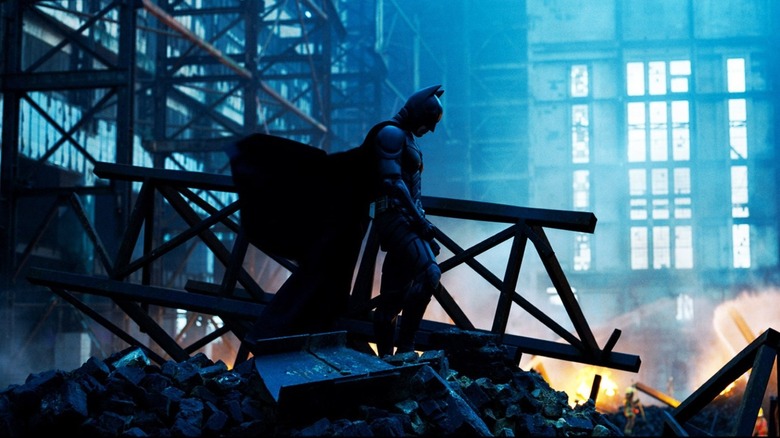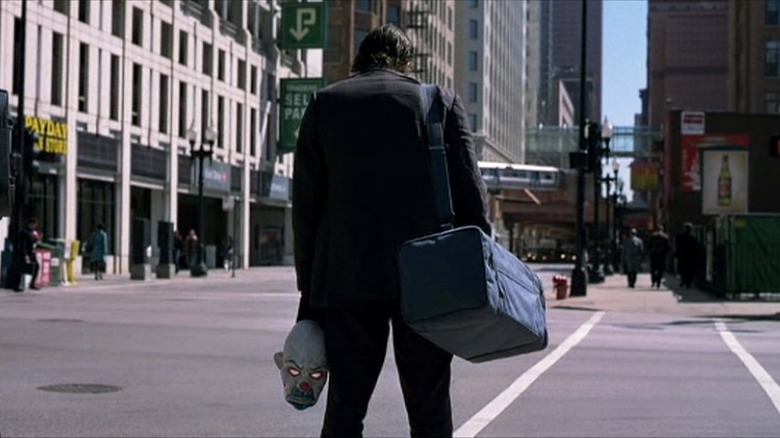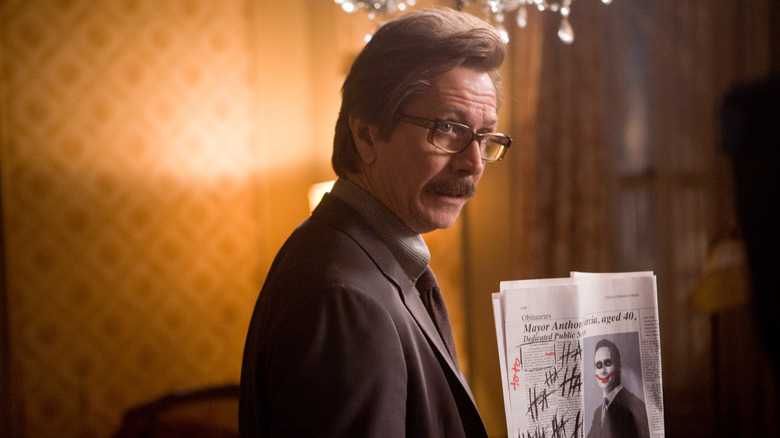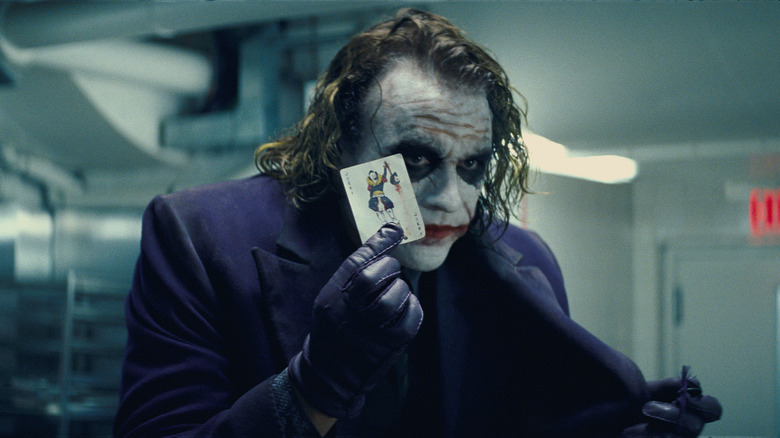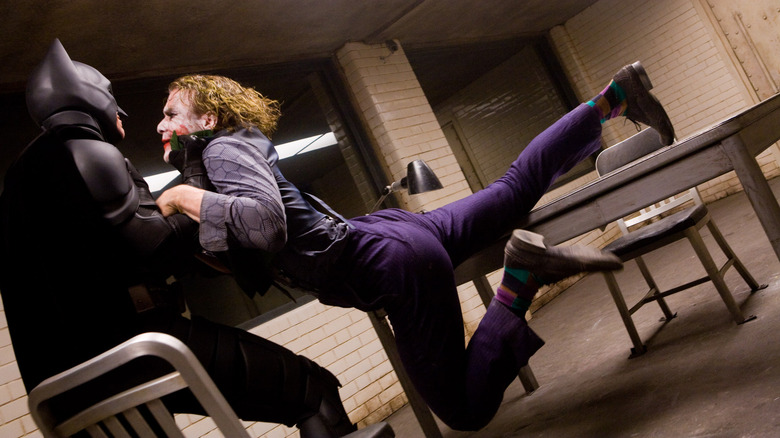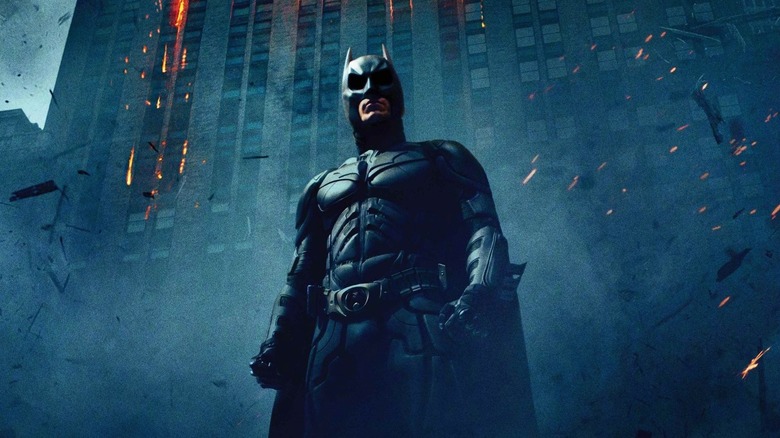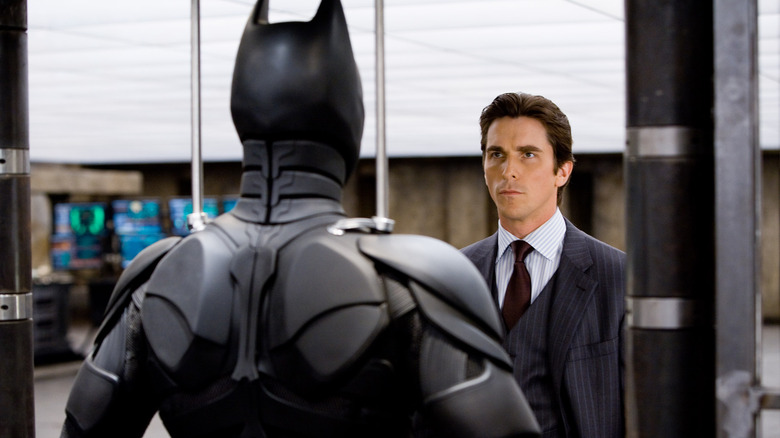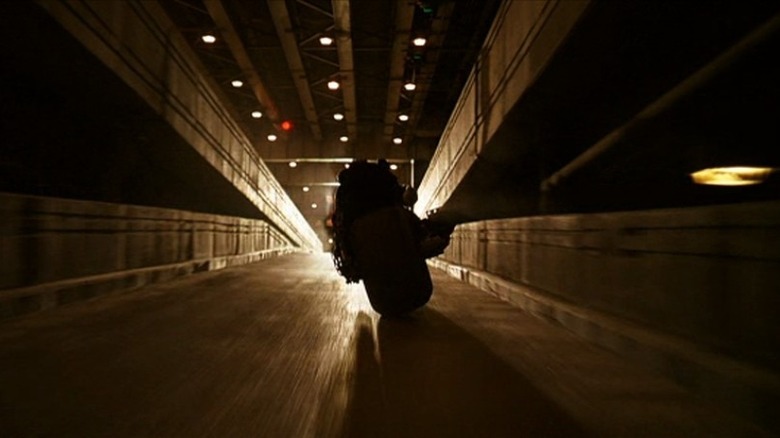Tales From The Box Office: The Dark Knight Was Simply Too Good To Be Ignored
(Welcome to Tales from the Box Office, our column that examines box office miracles, disasters, and everything in between, as well as what we can learn from them.)
In the history of blockbuster films — not just relegated to the world of comic book adaptations — few will ever be as beloved as Christopher Nolan's "The Dark Knight." From some absolutely classic action sequences to giving us one of the all-time great movie villains, this remains one of the shining examples of what blockbuster filmmaking can accomplish. At best, it can be so much more than empty popcorn cinema. This was and remains a best-case scenario for big-budget, big-screen entertainment.
What might get lost in the conversation all these years later is just how unbelievably massive this movie's success was compared to what came before. Have we seen sequels make more than their predecessors? You bet! But the degree to which "The Dark Knight" outdid "Batman Begins" was downright unheard of at the time. There are a number of reasons that it happened but, chief among them and not to be ignored is the fact that Nolan made a movie so good it was nearly impossible to ignore. Period.
In honor of the movie's 15th anniversary this week, we're looking back at "The Dark Knight," how it came to be, how a controversial casting decision turned into a defining screen performance for the ages, what happened when the movie hit theaters, and what lesson we can learn from it all these years later. Let's dig in, shall we?
The movie: The Dark Knight
Truthfully, the story of "The Dark Knight" really begins with the ending of "Batman Begins." Rather famously, Gary Oldman's Jim Gordon reveals a Joker card in the film's closing minutes that teed up the villain for the presumed follow-up. There are few rivalries in any other corner of pop culture quite as legendary as that of Batman and The Joker. Having that at the ready was automatically going to give the sequel a boost in terms of interest from the general public. All due respect to Scarecrow, but that's not a villain that has nearly as much name recognition.
Nolan once again teamed up with David S. Goyer ("Blade") and his brother Jonathan Nolan to pen the screenplay. "Batman Begins" was a decent hit ($371 million) but the best thing it had going for it was insanely positive reception, particularly compared to 1997's disastrous "Batman & Robin." Nolan, speaking to IndieWire in 2008, knew that he had to go bigger, but he also couldn't lose what he had captured the first time around. He said:
"[Producer] Emma [Thomas Nolan] and I had never done a sequel so for us, the main challenge was to continue the story appropriately and keep it stylistically and tonally consistent. You want to move the story forward and make it somehow larger or more important without losing what worked in the first one."
One thing that stands out about this movie, particularly in 2008, was the fact that it was 2 hours and 30 minutes long. That was a pretty hefty runtime for a summer blockbuster of this size. But as Nolan explained in that same interview, the story simply called for it.
"One of the reasons the film is 2-and-a-half hours long is because we tried everything we could on paper to make the story shorter but that was the story we had. In the end, we compressed it to the point where it was dizzying so then we had to flesh it out a little bit."
Fleshing out Gotham City
Christian Bale's Bruce Wayne and the other supporting players were returning to Gotham City once more for the follow-up, including Michael Caine's Alfred and Oldman as Gordon. But one bit of casting would change, with Katie Holmes surrendering the role of Rachel Dawes, leaving Maggie Gyllenhaal to take her place. Holmes, for her part, never gave a super specific reason for pulling out of the role, but she did address it in 2016 in an interview with Business Insider.
"I really enjoyed working on the first one and I wish I could have worked with Chris Nolan again and I hope to work with him again. It was a decision that I made at that time and it was right for me at that moment, so I don't have any regrets."
One of the most important new additions to the cast was Aaron Eckhart, who would be taking on the role of Harvey Dent and yes, eventually Two-Face. Eckhart got the role after Matt Damon passed. While The Joker (we'll get to that in a moment) was clearly the focus in the marketing, Nolan was indeed dealing with two major villains from Batman's rogues gallery in the same film.
On paper, it ran the risk of becoming over-stuffed and overly complex. In the end, the way the characters play off of one another ended up being one of the things that makes the movie truly tick. Joker gets the bulk of the credit in this film, but the fact that Eckhart also delivers a top-tier performance on the road to becoming Two-Face speaks volumes about the quality of the film. But nobody could have known what Heath Ledger was about to do with his take on the Clown Prince of Crime.
Crafting The Joker
Context is very much needed to understand how unlikely it seemed that Ledger would turn in one of the all-time great villain performances in cinema history. This was the guy who had just turned in an Academy Award-nominated performance in "Brokeback Mountain," which would, unfortunately, be labeled reductively by many, as the gay cowboy movie. "I didn't get it, the studio didn't get it. And the fan community was ... we were f***ing pilloried for it," Jonathan Nolan said, reflecting on the casting in an interview with The Hollywood Reporter in 2018.
Nolan was quite sure of the casting decision, as Ledger was the only actor seriously considered. In taking on the role, Ledger was very aware of the legacy that Jack Nicholson left behind with his performance in Tim Burton's "Batman." That said, speaking with Empire in an oral history about bringing the film's Joker to life, the actor believed Nolan's approach would necessitate a very different performance.
"I was a huge fan of Jack Nicholson's Joker, but, you know, having seen Chris' first [Batman] film, I knew there was a big difference between a Chris Nolan film and a Tim Burton film. And so therefore there was enough room for a fresh portrayal."
As for the approach on the page, Nolan and Goyer had the same thought. "I just never felt that the Joker was scary. Chris and I wanted the Joker to be scary," Goyer said in that same Empire piece. "Our Joker — Heath's interpretation of The Joker — has always been the absolute extreme of anarchy and chaos, effectively," Nolan added.
Brilliance before tragedy
Ledger completely transformed for the role. Not just in terms of the makeup and costume, but it was very hard to comprehend that the guy underneath that makeup delivering that performance was the same guy from "A Knight's Tale." It was jarring. "I found it remarkable how much I wasn't looking at Heath. I was just looking at the Joker. He became invisible. He became the Joker completely," Bale said to ABC in 2008 several months after the release.
Aside from wanting to make the character the embodiment of chaos, Nolan also didn't want to do an origin story for the character. He wanted to leave the mystery intact, which very much made for some great moments in the film. Speaking to IGN in 2007, the director explained:
"Well, we never wanted to do an origin story for the Joker in this film. The arc of the story is much more Harvey Dent's; the Joker is presented as an absolute. It's a very thrilling element in the film, and a very important element, but we wanted to deal with the rise of the Joker not the origin of the Joker, if that makes sense."
What resulted was a performance that would end up winning the Oscar for Best Supporting Actor in 2009. Tragically though, Ledger would not live to see his work rewarded, as the actor passed away at just 28 years old in January of 2008. The actor's death rocked Hollywood and it cast a shadow over the release. It also brought even more attention to what was already shaping up to be one of the most-anticipated summer blockbusters ever.
A marketing campaign for the ages
I generally try to keep personal feelings and stories out of this column, but my experience with this movie might just help paint the picture of its ridiculous success. Not to make myself unpopular here, but I have never been a fan of Batman as a superhero. So, when "Batman Begins" came about, I didn't care all that much. I didn't see it in theaters, I didn't watch it on DVD. I was too caught up in the "X-Men" and "Spider-Man" movies. Then that trailer for "The Dark Knight" arrived and everything changed.
The power of a great marketing campaign can't be overstated, and the cornerstone of that is a great trailer. This movie had a great trailer — one that got me to care deeply about the sequel to a movie I didn't see. That's something. And based on the ticket sales (more on that in a minute), it's clear I wasn't alone in being won over by what Warner Bros. was selling here. That trailer, those posters, it was all so intriguing and exciting. It always helps when you've got a movie as good as this to sell but still. Good movies have been sold poorly plenty of times, just look at "Edge of Tomorrow."
But WB didn't limit the campaign to great trailers and great taglines (like "Why so serious?" all over those Joker posters). They also ran a very successful ARG (augmented reality game) campaign as a means of getting a little creative with it. This included sneaking Joker cards that said "I Believe In Harvey Dent Too" in comic shops across the country. The combination of factors worked like gangbusters, as Nolan's latest was about to find itself on the right side of a record-breaking run.
The financial journey
What's fascinating in hindsight is that "The Dark Knight" did not hit theaters uncontested. Warner Bros. decided to release the $185 million-budgeted film on July 18, 2008, the very same day that Universal opted to release "Mamma Mia!" While both movies were obviously targeting very different audiences, they were both poised to be big hits. Fortunately, they worked as counter-programming and Batman's latest adventure suffered not.
Against a tidal wave of wildly positive reviews, Nolan's second DC Comics adaptation scored the best opening weekend of all time up to that point, taking in $158.4 million domestically. That was truly just the beginning. The film ended up becoming the fastest film to cross the $500 million domestic mark at that time in just 45 days. The movie just kept bringing audiences out week after week, all over the world. All told, it finished with $533.3 million domestically and $469.7 million internationally for a grand total of just over $1 billion.
"Batman Begins," for context, earned $371 million worldwide three years earlier. "The Dark Knight" earned an astonishing 2.69 times more than its predecessor. In the realm of blockbuster filmmaking, that was unheard of at the time. And, quite frankly, even now, it's extremely rare air. You'd be looking at something like "Captain America: The First Avenger" ($370 million worldwide) to "The Winter Soldier" ($714 million worldwide) to even get close.
One would be hard-pressed to find a blockbuster made in the last 20 years that people roundly love more than this one. It was nominated for eight Oscars and its lack of a Best Picture nomination has long been considered a big snub. In the simplest terms, Nolan's vision of cinematic excellence is what got the job done. The positivity surrounding this movie was effusive and it was that kind of "you must see this movie" buzz that can't be fabricated. It was undeniably real.
The lessons contained within
The lessons left behind with this film are, in my view, pretty obvious but no less important in the landscape as it currently exists. First and foremost, there is absolutely no substitute for greatness. Yes, sometimes a good movie can slip through the cracks and become a victim of a bad situation. "Booksmart" is a very good example of this. But true, honest to God, unimpeachable greatness? It's rare for that to be ignored, particularly when you're dealing with one of the most popular superheroes on the planet. Yes, this movie, along with "Iron Man" that very same year, demonstrated just how insanely high the highs can be in superhero filmmaking. Though both movies accomplished what they accomplished because they were, above all else, great.
What Warner Bros. allowed Christopher Nolan to do in that DC Comics sandbox feels like a miracle. Movies based on closely guarded intellectual property just aren't supposed to be this good. But we're talking about generational talent colliding in a perfect storm that can't possibly be replicated. The lesson shouldn't have been "Superheroes are the path to blockbuster success." It should have been that allowing true filmmakers to actually do something interesting with IP is where commercial and artistic interests can intersect with the best results for all involved.
Aside from that, the whole "dark and gritty" really caught on in the aftermath of this movie's success. Some movies did it well, such as "Skyfall." But dark for the sake of dark doesn't mean people will like it more. That was an element of this movie's success, sure, but it worked for "The Dark Knight." There is more nuance to success than studio thinking seems to allow for a lot of the time. This version of Batman was suited well by dark and gritty. Stuff like "Fantastic Four" on the other hand? Not so much.
